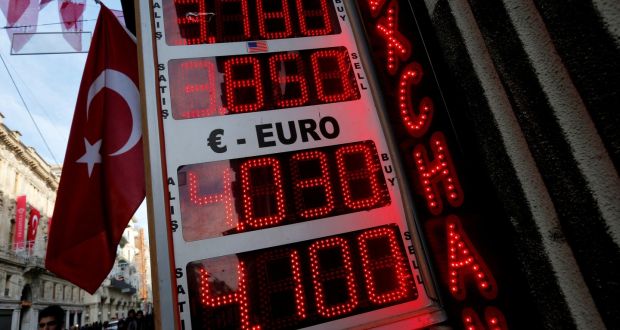Turkey’s embattled currency the lira on Tuesday plunged to new lows against the dollar and the euro, with investors fearing strong growth was masking the risks of high inflation and overheating.
Turkish authorities last month reported strong growth of 7.4 percent in 2017 but inflation remains in double figures and concerns have mounted over the current account deficit.
The lira is now trading above four to the dollar and five to the euro for the first time ever and analysts fear the pressure on the currency is far from over. On Tuesday it hit a new record high of 4.13 to the dollar, a loss of 1.4 percent in value on the day. Against the euro it was trading at a new record of 5.10, down 1.8 percent on the day. In the last month alone the lira has lost 8.0 percent in value against the dollar and 8.5 percent against the euro.
Turkey's lira dropped more than 1% today to a new historic low.
A couple factors that are weighing:
-Media reports that Turkey's deputy prime minister tried to resign (was denied by the gov't)
-Concern that the economy is overheatinghttps://t.co/fjONIQxCaJ w/ @laurapitel pic.twitter.com/CIWKuGHtSh
— Adam Samson (@adamsamson) April 5, 2018
Economists say that with crucial 2019 elections on the horizon the government is more concerned about stoking growth than controlling inflation but this is spooking markets. Erdogan has repeatedly called on the central bank — nominally independent — to cut interest rates to boost growth. He argues lower rates will help reduce inflation, a position that flies in the face of economic orthodoxy.
Fears were amplified last week when rumours flew that Deputy Prime Minister Mehmet Simsek — an ex-Merrill Lynch economist trusted by markets — was on the verge of resigning. But this was denied and Simsek remains in his job.
“Not only the government’s resolve to keep the elevated level of growth… but also the consistent call for lower interest rates will likely keep the currency pressurised,” said economists at QNB Finansbank in a note to clients.
Since the failed coup bid of July 2016, the lira has lost over 43 percent in value against the dollar. Erdogan’s spokesman Ibrahim Kalin told reporters in a briefing at the weekend that Erdogan wanted lower rates to boost industry and acknowledged the central bank may not share this view.
“He believes that lowering interest rates will help boost the Turkish economy, help the small and medium companies and help bring more investment. He has been clear about this,” Kalin said. “Some others, the central bank, may have a different point of view but they make their own decision and the president makes his own comments.”




Comments are closed.